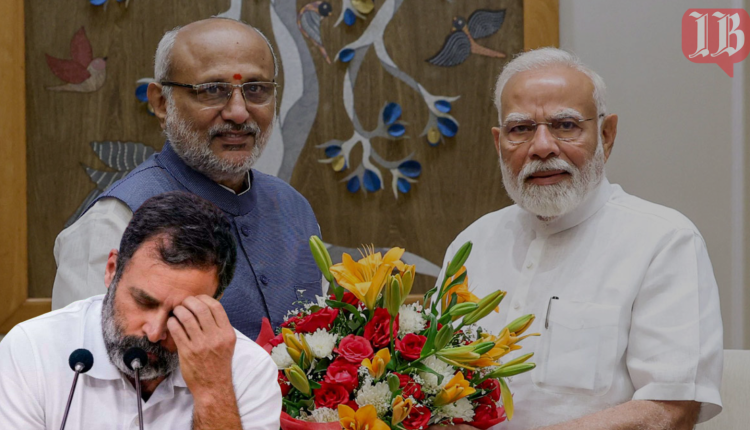New Delhi: The INDIA alliance suffered a bruising defeat in Tuesday’s vice-presidential election, as cross-voting by at least 20 of its MPs delivered an unexpected triumph to the National Democratic Alliance’s (NDA) candidate, C P Radhakrishnan.
The Maharashtra Governor and BJP stalwart secured 452 votes — 25 more than anticipated — trouncing the Opposition’s nominee, former Supreme Court judge Justice B Sudershan Reddy, who managed 300 votes in a high-stakes parliamentary poll. This electoral battle, marked by a 98% turnout among 781 MPs, lays bare the fragility of the INDIA bloc’s unity and underscores the unpredictable power of secret ballots in Indian politics.
Taking lessons from the 1990s coalition upheavals to the NDA’s modern dominance, this outcome is more than a numerical loss — it’s a stark warning for the Opposition. The INDIA alliance, formed to counter the BJP post-2024 Lok Sabha polls, entered the race banking on its 354-strong MP tally (249 Lok Sabha, 105 Rajya Sabha). Yet, defections from parties like the Trinamool Congress (TMC), DMK, and even Congress MPs — possibly driven by regional rivalries or covert inducements — slashed Reddy’s vote share by at least 54, factoring in 15 invalid votes and 14 abstentions. This isn’t just a defeat; it’s a public unravelling of a coalition that promised to challenge the NDA’s grip.
The election, held in the new Parliament building amid Delhi’s monsoon drizzle, began at 10 am with Prime Minister Narendra Modi casting the first vote. By 6 pm, Returning Officer P C Mody announced Radhakrishnan’s victory, needing 391 votes in the single-transferable vote system. The NDA, with 422 MPs plus neutral support from YSR Congress and BJD, expected a tight win but gained a windfall from cross-voters, including an estimated seven TMC MPs and three to five from DMK, lured by Radhakrishnan’s Tamil roots. Congress insiders also admitted to two to three defectors from Uttar Pradesh, echoing historical betrayals like the 1969 VP poll that reshaped Indira Gandhi’s Congress.
The secret ballot, unencumbered by party whips, proved a double-edged sword. Digital tools like encrypted WhatsApp groups likely facilitated discreet defections, a far cry from the clandestine deals of earlier days. This tech-savvy subversion — think anonymous polling apps over late-night parleys — caught the Opposition off-guard, who banked on rallies rather than monitoring digital chatter. Congress chief Mallikarjun Kharge, visibly irate, called it “a betrayal of our mandate,” while Shiv Sena (UBT)’s Priyanka Chaturvedi lamented “disloyalty over principle.”
Meanwhile, NDA’s Amit Shah hailed the win as a “verdict for stability,” subtly mocking the Opposition’s disarray.
Radhakrishnan’s ascent, replacing Jagdeep Dhankhar who resigned abruptly in July 2025, signals the NDA’s knack for fielding loyalists with regional appeal. The 78-year-old’s governance in Jharkhand and Kerala, though controversial, resonated with some southern MPs, amplifying his tally. Conversely, Reddy, a Telangana jurist known for environmental rulings, failed to unify the Opposition’s urban and rural factions, his campaign rhetoric on “constitutional integrity” drowned out by internal squabbles.
This poll exposes deeper cracks. The INDIA bloc’s inability to deliver its full vote bank — despite pre-poll bravado from JMM’s Mahua Maji and others — hints at leadership vacuums and regional satraps’ egos, risking further erosion before 2029. The NDA, while celebrating, must heed the 14 abstentions, notably from Shiromani Akali Dal over Punjab grievances, signaling potential chinks.
As fireworks lit Delhi’s skies, the vice-presidential race proved a battleground where loyalty is currency, and betrayal, the ultimate wildcard. The INDIA bloc now faces a reckoning, while Radhakrishnan’s win strengthens the NDA’s narrative of unassailable dominance.



Comments are closed.